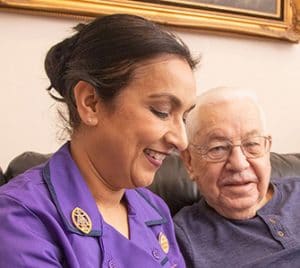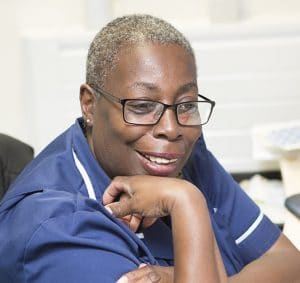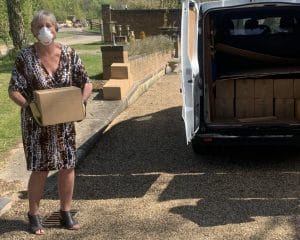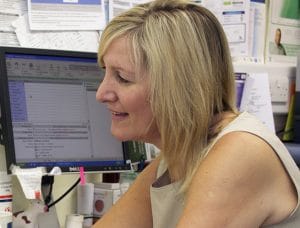Queen’s Nurses on the Covid-19 Frontline
Queen’s Nurses are delivering frontline care to patients in community and social care settings during the Covid-19 outbreak.
Queen’s Nurses are among the thousands of nurses delivering vital healthcare to people in the community and social care settings during the Covid-19 outbreak.
The QNI’s main resource page for Covid-19 resources can be found here: www.qni.org.uk/nursing-in-the-community/care-home-nurses-network/coronavirus-information-centre/
The cast of BBC TV’s Call the Midwife recently made a thank you tribute film for Queen’s Nurses. To see the film visit: https://www.facebook.com/watch/?v=2961244187231882 or on the QNI’s Vimeo channel.
To donate to the QNI and support our Queen’s Nurses, please go to: www.qni.org.uk/explore-qni/support/donate-to-qni/
Queen’s Nurse Covid-19 Case Studies
Parveen Akhtar, Queen’s Nurse, Palliative Care Community Matron

‘As you can imagine its very challenging times. We have been supporting the care home staff to care for Covid 19 Positive patients by teaching them the basic fundamentals of care for the dying patient. We as a team have also supported the patient in symptom management and keeping the family up to date. Some care homes have allowed 1 family member to visit the dying patient and the care home staff have stayed with the patients in the last few hours.
The care home staff have been amazing ensuring these patients have had a good death. We have been reviewing patients in their own homes and supporting families whilst donning our PPE.
I have today arranged a husband to see his wife for the last time in the chapel of rest. The funeral directors were not allowing him to visit due to Covid 19 protocol. I informed them that the only person at potential risk will be the husband. Neither his wife or himself were Covid 19 positive. However the funeral home was still reluctant to have him visit her. After much discussion with the head office and informing them that we will provide the PPE, they agreed. The husband was very pleased as we will provide him with a lasting wish to see his wife, who he has been married to for over 46 years. They celebrated 51 years of first meeting the day before she died and now he will be able to say his last goodbyes.’
The husband was very pleased as we will provide him with a lasting wish to see his wife, who he has been married to for over 46 years. They celebrated 51 years of first meeting the day before she died and now he will be able to say his last goodbyes.
Parveen Akhtar, Queen's Nurse, Palliative Care Community MatronCarol Webley-Brown, Queen’s Nurse, General Practice Nurse

An extract from Carol’s blog: ‘In my role as lead nurse for frequent attenders to Accident and Emergency – the High Intensive Users, the service I call Extra Support Services, I ring, text or email my patients – about 20 of them – every day. Alongside Social Services we ensure they have food, medications, and understand that to stay safe, they must stay at home.
It is difficult for them, as the hospital has been a place where they get the attention they need, and to be admitted has in the past has confirmed that something is wrong with them. To ring 111 and be told that nothing is wrong with you is a hard message to hear and process.
Luckily I have a relationship with them and can usually help them with mindfulness strategies. This has helped. Other patients have found that faith is important, but some have found religion difficult as Easter did not seem like Easter and their faith, their hope has been disturbed.’ Click here to read the full blog.
It is difficult for them as hospital has been a place where they get the attention they need, and to be admitted has in the past confirmed that something is wrong with them.
Carol Webley-Brown, Queen's Nurse, General Practice NurseMiranda Wixon, Queen’s Nurse

I have recently set up a service in South Northamptonshire to respond to the pandemic. Working as a volunteer with SOFEA (South Oxfordshire Food and Education Alliance)and FareShare I have set up an emergency community larder to deliver emergency food parcels to people isolating at home to improve their health and wellbeing and to assist the pressures on acute services by maintaining people at home. Within three weeks I have managed to reach out to 90% of the parishes within South Northants and through around 500 volunteers have delivered 720 food parcels into homes this week. We now are the go-to for the Council emergency help lines and have support from the grass routes to our local MP. All this in three weeks. The response has been overwhelming and truly heart warming. It is so much more than food, the reaching out to each other and letting our neighbours know that we care, the support to volunteers who want so much to be part of the solution against Coronavirus, the redistribution of food from FareShare that would otherwise go to waste, the acts of giving are all aspects that good community nursing and the QNI hold dear.
As a Queen’s Nurse I want to share this project with colleagues at a time when the focus of nursing is rightly on the acute sector, I wanted to show that we are all doing our bit to help each other to keep people well and safe at this terrible time. This project is a glimmer of hope that we can rebuild a legacy after the pandemic is over where our communities have hope of caring for each other while during the pandemic we keep each other safe.
This project is a glimmer of hope that we can rebuild a legacy after the pandemic is over.
Miranda Wixon, Queen's NurseDebbie Brown, Queen’s Nurse, ANP

It certainly is unprecedented times, however, I was one of the lucky ones. As an ANP I have been doing email and telephone consultations for a few years, so many of the patients with LTCs are used to having non-face to face consultations. Although video consultations have been a new experience, the patients have become comfortable with them, both young and old. I use the video for some triage calls, e.g., rashes, injuries, sore throats, COVID-19 symptoms, for teaching and supporting self-administration of Insulin and contraception, observing and advising wound care, and to have difficult conversations about advance care planning, of course all with consent and the offer of a chaperone if requested/appropriate. I send text messages via the same system, upload information including recommended apps, for LTC, exercises, mental health and wellbeing. Some patients still need to attend for initiation of insulin if IFCC levels are high and symptomatic. Each patient is assessed on individual need; so far working well.
Each patient is assessed on individual need; so far working well.
Debbie Brown